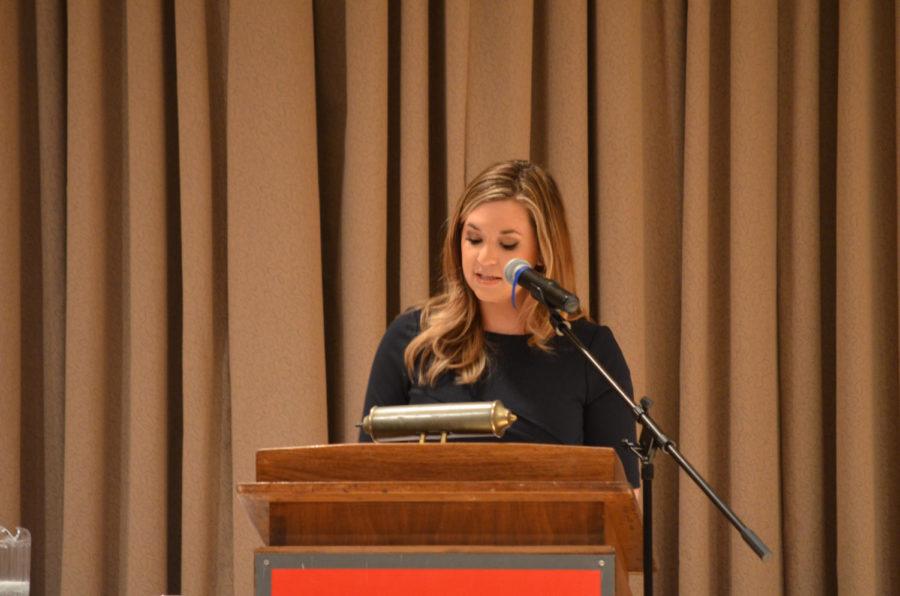Speaker shares alternative sexual assault views
Katy Klopfenstein/Iowa State Daily
Katie Pavlich spoke about the conservative viewpoint on sexual assault on college campuses. She also answered numerous questions in the Sunroom of the Memorial Union on Tuesday.
March 11, 2015
Author and conservative political commentator Katie Pavlich suggested that students should be able to carry guns on college campuses to prevent sexual assault during a lecture Tuesday at the Memorial Union.
Pavlich, author of the book “Assault and Flattery: The Truth About the Left and Their War on Women,” offered what she called a “conservative view” on sexual assault.
“We don’t live in a rape culture in the U.S.,” Pavlich said. “And it’s an affront to women all over the world who do live in rape cultures to say this.”
Pavlich suggested that criminalizing rape and teaching men not to rape is not effective and is only the start to ending sexual assault on campus. Her solution to the problem was allowing students to have concealed weapons on campus.
“Let’s keep teaching everyone that rape is barbaric, while also teaching them to defend themselves,” she said.
Pavlich supported her argument with stories of women raped at gunpoint and stalked on college campuses. She explained that gun-free zones aren’t protecting students from violence, adding that universities fail to teach students how to handle violent situations on their own.
Seven U.S. states allow concealed carry weapons on college campuses due to state legislation, including Colorado, Idaho, Kansas, Mississippi, Oregon, Utah and Wisconsin. But Iowa is one of 23 states where colleges and universities are allowed to make their own decision banning or allowing concealed carry weapons, according to the National Conference of State Legislatures. Currently at Iowa State, it’s not allowed.
“We are asking for our own right to do what campus security cannot do,” Pavlich said. “The most appropriate reaction is sometimes pulling out a handgun and making sure your rapist never rapes again.”
Pavlich was met with resistance from multiple ISU students, including a large group of purple-clad students attending the lecture as part of an organized effort called “Standing up to Katie Pavlich and Rape Culture.” Itzel Padron Zuniga, junior in women’s studies, led the group.
“We asked people to wear purple here in solidarity with victims of sexual assault,” Zuniga said.
For Zuniga, adding guns to the issue of sexual assault undercuts the issue at hand.
“I think that comes from a huge misconception of how sexual assault happens,” she said. “To tell a woman to feel empowered with a gun undermines the fact that rapists aren’t in a dark alley. They’re people we know and love.”
Zuniga said that Americans haven’t really begun addressing the root of sexual assault – teaching people not to rape.
“We’re talking about what consent means – and how to identify consent in different situations,” Zuniga said. “We’re talking about a justice system that respects victims and holds rapists accountable for their actions.”
Pavlich’s presentation was sponsored by the College Republicans, the Committee on Lectures and Young America’s Foundation, an organization dedicated to promoting conservative ideals through presentations and campus lectures.
Nigel Hanson, president of the College Republicans and junior in political science, said that although the College Republicans have not taken an official stance on concealed carry laws on campus, he appreciated Pavlich’s views on sexual assault.
“It might be agitating, but she wants to work to fix the problem,” Hanson said. “I think it opened our eyes to some new perspective.”
Pavlich spent more than 25 minutes — from about 20 students — answering questions after her lecture, some from students who had been sexually assaulted by a friend or an acquaintance. Since the vast majority of rapes are perpetrated by acquaintances, students asked Pavlich how they should be expected to shoot someone they know.
“I’m not suggesting you do anything [in that situation],” Pavlich responded. “I’m suggesting that everyone has the option to do this.”
Robert Dunn, a senior in pre-business, said he agreed, saying that the point isn’t to put more blame on the victim; rather, it’s to give men and women the option to have weapons if it would make them feel safer.
“The constitution doesn’t end this side of Lincoln Way,” Dunn said. “Everyone should have the right to defend themselves.”
Pavlich also wanted to de-bunk the commonly held statistic from the Justice Department’s National Institute of Justice that one in five women on college campuses are sexually assaulted. Pavlich claimed that the number is actually much lower, saying that only about one in 1000 women are assaulted in their lifetimes, according to figures from conservative research “think-tank” American Enterprise Institute.
“Rather than interrogating the accuracy of the numbers, she’s replacing them with information bent to meet a conservative agenda,” said Michael Goebel, lecturer of the Women’s Studies Program.
“This talk was incredibly irresponsible,” Goebel said. “It was a ‘conservative take on sexual assault,’ but it was clear her intent was to advocate for concealed carry laws.”
Goebel was also shocked with the way Pavlich answered questions.
“She was condescending with every person who pushed her on her point,” Goebel explained. “There was no intellectual heft to it. She was shutting people down.”
Goebel added that none of Pavlich’s solutions addressed the real problem of sexual assault on campus.
“Saying, ‘it’s going to happen, so we might as well be armed for it,’ is defeatist at best,” Goebel said. “It’s not about creating a system that’s more equitable.”

















